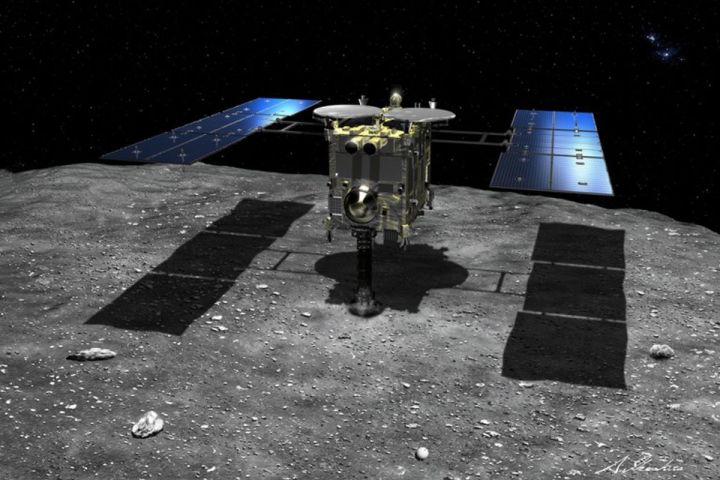
The fact that most people occasionally have trouble maneuvering a car into a tight space makes it all the more remarkable that the very same species has just parked a satellite onto a small boulder-strewn asteroid hurtling through the universe millions of miles from Earth.
The astonishing feat was achieved by Japan’s space agency (JAXA) at about 3 p.m. PT on February 21 when it landed Hayabusa2 on the asteroid Ryugu.
The successful touchdown on the 900-meter-wide space rock was met with enthusiastic applause at JAXA’s Tsukuba Space Center near Tokyo, and allowed the team to proceed to the next stage of the highly complex mission, which should ultimately see a sample from the space rock returned to Earth.
Shortly before descending onto Ryugu, Hayabusa2 fired what is essentially a 2-kilogram bullet into the asteroid in a bid to throw up particles that it’s now attempting to collect. JAXA has confirmed that the bullet fired as planned, though we’re still waiting for news about whether the rock sample has been successfully gathered.
Next, Hayabusa2 will return to its home position a short distance from the asteroid, a maneuver that’s expected to take around 11 hours to complete.
Brian May appearance
Easily the second most astonishing moment of the day’s events was the unexpected appearance of Queen guitarist and astrophysicist Brian May in JAXA’s live video feed.
Just minutes before Hayabusa2 touched down, the space enthusiast wished the team “absolutely the best of luck in this incredibly delicate maneuver,” adding, “My heart is with you … we love you Hayabusa2.”

Hayabusa2 reached Ryugu in June 2018 after a journey of three-and-a-half years. Since arriving, it’s been staying close to the asteroid, tracking it as it hurtles through space.
It’s also been carrying out various exploratory activities, and in September successfully deployed two rovers onto the rock. The rovers have been capturing close-up images of their surroundings, and performing tasks such as taking temperature readings of the asteroid’s surface.
If all goes to plan, the sample collected by Hayabusa2 is expected to reach Earth toward the end of 2020, with scientists hoping the asteroid particles will offer new insight into the development of our planet, our solar system, and possibly beyond.


